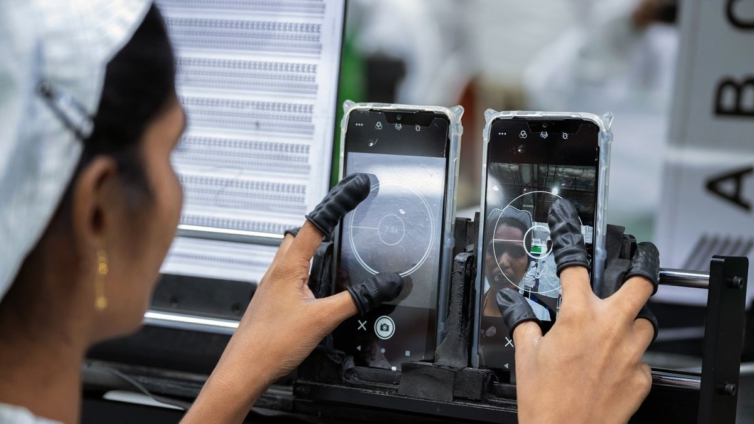India is giving more than a dozen companies new incentives to invest in the country's smartphone industry, bolstering an ambitious campaign from Prime Minister Narendra Modi to rebrand the country as the world's next manufacturing hub.
The program includes 16 companies involved in making smartphones and components, including Samsung (SSNLF), Austria's AT&S and several Indian firms. Major Apple (AAPL) suppliers Foxconn, Wistron and Pegatron are participating as well — notable inclusions, given how much Apple has been pushing to grab a larger slice of one of the world's fastest growing smartphone markets.
The companies have to increase their production of smartphones in the country to benefit, according to a Tuesday statement from India's Ministry of Electronics and Information and Technology. They will get incentives worth between 4% and 6% of the sales of certain products made in India over a period of 5 years.
The incentive program is expected to bring 110 billion rupees ($1.5 billion) worth of investment to the country's electronics manufacturing industry,according to the government statement.
The government's decision to incentivize smartphone makers isn't a huge surprise. The industry has been booming in India, and is now worth about $230 billion, according to the India Cellular and Electronics Association.
China's Xiaomi tripled the number of smartphone plants it has in India on its way to top spot in the market, while global leader Samsung opened what it claims is the "world's largest mobile factory" near New Delhi in 2018. Apple began manufacturing some iPhones in Bangalore in 2017and recently started domestic production of the iPhone 11.
While the Indian government named the program's participants, it did not disclose how much each company is expected to invest.But Reuters reported, citing sources, that Foxconn, Wistron and Pegatron plan to invest nearly $900 million in the next five years to benefit from the incentives.
Foxconn, Wistron and Pegatron did not immediately respond to a request for comment. Foxconn chairman Liu Young-Way reportedly said at a shareholders meeting in June that the company was planning further investment in India. The Taiwanese firm already has a plant in India, where it manufactures smartphones for Apple and other clients.
Apple and Samsung "together account for nearly 60% of global sales revenue of mobile phones," the Ministry of Electronics and Information and Technology said, adding that the program was expected to "increase their manufacturing base manifold in the country."
Apple's ambitions
For Apple, the nod from regulators for its suppliers could provide a tailwind for the company's India ambitions.
Apple holds less than 2% of India's smartphone market, though has been trying to grow that amount and increase its presence in the country. The iPhone maker launched its online store in the country last month,and it also wants to open its first physical store there next year.
Part of the problem is that many of the company's products are seen as prohibitively expensive for most Indians.
Apple sets prices in different countries based in part on taxes and the local currency's strength against the dollar. The 64GB variant of the iPhone XR costs about $120 more in India than it does in the United States.
Expanding local smartphone production would allow Apple to avoid India's heavy import taxes on iPhones, potentially making them cheaper for Indian customers.
The government's new incentives could mean that "more of the local India iPhones sales is catered by the locally produced iPhones, which would bring down the cost," said IDC senior research manager Kiranjeet Kaur. She noted that so far, iPhones made in India are older generation models, with new flagship phones still coming from China.
Apple is also expected to release its latest iPhone later this month, and Wedbush analyst Dan Ives said there is "a spike in demand out of India."
The "region could translate into some surprising iPhone units upside as Apple heads into this key launch period," Ives wrote in a note on Wednesday.
Latest Stories
-
National Service allowances to be increased in next service year – Director-General assures
47 seconds -
NPP constitutes 9-member committee to spearhead National Delegates Conference
43 minutes -
NPP slams police over delay in Ablekuma North collation, accuses NDC of obstruction
45 minutes -
Gov’t must invest in local industry and patient capital to sustain economic gains – Coconut Grove Regency CEO
52 minutes -
I’m not pro-state, my judgement is guided by law – Justice Bartels-Kodwo
53 minutes -
NPP to elect 2028 flagbearer on January 31, 2026
1 hour -
Ahwoi family mourns their sister, Ama Adoma Bartels-Kodwo
1 hour -
Coconut Grove Hotels slash rates by up to 30% in response to strengthening Cedi, falling inflation
1 hour -
It’s time to strongly advocate for non-custodial sentences – Justice Bartels-Kodwo
2 hours -
SLTF unlocks access for under-18s on No-Fees-Stress registration portal
2 hours -
James Varrick Armaah’s Legacy: 63 gospel songs and 4 albums with Harmonious Chorale
2 hours -
Ghana Beach Volleyball teams wrap up final preparations ahead of Africa Championship in Morocco
2 hours -
Sex at 16: Education is ultimate contraceptive – Justice Bartels-Kodwo
2 hours -
Justice Bartels-Kodwo urges nationwide judicial reforms and major infrastructure investment
2 hours -
Stakeholders advocate coastal resilience through indigenous knowledge and community action
2 hours

